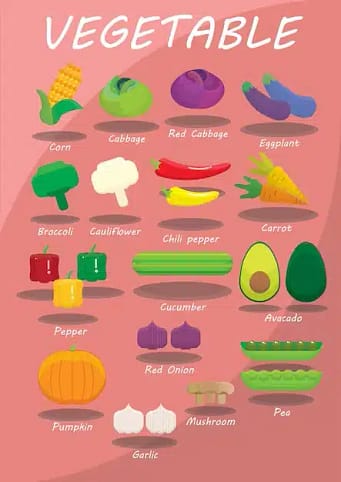We become more confused as we explore the mysterious link between dogs and the fascinating world of aubergine. A confused pet owner wonders whether their canine dog can safely eat this brilliant purple treat while exploring the vegetable aisle. Can dogs enjoy the culinary pleasures of the eggplant kingdom?
That is a real issue that arises when we explore the culinary secrets and travel the complexities of a dog’s dietary requirements. Get ready to start a search for information that cuts across species boundaries and grabs your interest. Let’s see

Table of Contents
Toggle1.Is Eggplant Safe for Dogs?
The quick answer is yes; plain Eggplant is safe for dogs. Unlike other human foods that are toxic to dogs, Eggplant is not poisonous. However, a few considerations should be considered before feeding your dog this vegetable.
1. Allergic Reactions
While Eggplant is generally safe, some dogs may be allergic to it. Allergic reactions can display as itchiness, rash, upset stomach, facial swelling, vomiting, or a sore tummy. If your dog shows any of these symptoms after consuming Eggplant, it is best to consult your veterinarian.
2. Nightshade Family
The Eggplant is a member of the nightshade family of vegetables, including tomatoes, potatoes, and peppers. These vegetables contain a natural compound called solanine, which can be toxic in high concentrations. While Eggplant itself is not harmful, dogs with sensitivities or allergies to other nightshade vegetables may also react negatively.
3. Oxalate Content
Another factor to consider is the high oxalate content in Eggplant. Naturally occurring compounds called oxalates can interfere with calcium absorption and potentially contribute to kidney and bladder stone formation. Dogs with existing kidney problems or a history of kidney stones should avoid or limit their consumption of Eggplant.
2.Nutritional Value of Eggplant
Eggplant is not only safe for dogs, but it also offers several nutritional benefits. Let’s take a closer look at the vitamins and minerals found in this vegetable:
| Nutrient | Amount per 99g of Eggplant |
| Protein | 0.82 grams |
| Fat | 0.23 grams |
| Calories | 35 |
| Carbohydrates | 8.64 grams |
| Potassium | 188 milligrams |
| Dietary Fiber | 2.5 grams |
| Calcium | 6 milligrams |
| Zinc | 0.12 milligrams |
| Sodium | 1 milligram |
| Iron | 0.25 milligrams |
| Vitamin C | 1.3 milligrams |
| Phosphorus | 15 milligrams |
| Magnesium | 11 milligrams |
| Vitamin B6 | 85 micrograms |
| Folate | 14 micrograms |
| Vitamin K | 2.9 micrograms |
Eggplant also contains flavonoids like anthocyanins, which give it its distinctive purple colour. Flavonoids are pigments that some believe provide health benefits.
3.Potential Benefits of Eggplant for Dogs
While more research is needed to understand the potential benefits of Eggplant for dogs fully, its nutritional profile suggests some advantages. Here are a few potential benefits of incorporating Eggplant into your dog’s diet:
1. Heart Health
Eggplant contains potassium, fibre, phytonutrients, vitamin B6, and vitamin C, all of which can improve heart health. These nutrients help prevent heart disease and promote overall cardiovascular well-being in dogs.
2. Blood Pressure Regulation
Anthocyanins, the flavonoids in Eggplant, have been associated with lower blood pressure in humans. Increased intake of anthocyanins through eggplant consumption may also positively affect blood pressure regulation in dogs.
3. Antioxidant Properties
The presence of flavonoids and other antioxidants in Eggplant may help combat harmful free radicals in your dog’s body. Antioxidants protect cells from oxidative stress.
4. Weight Management
Eggplant is low in calories and fibre, making it a suitable addition to a weight management diet for dogs. The fibre content can help dogs feel full while consuming fewer calories, aiding in weight control.
5. Brain Health
Nasunin, an anthocyanin phytonutrient found in Eggplant, has been associated with enhanced brain function and keep of brain damage. While further studies are needed, Eggplant may offer cognitive benefits for dogs.
4.How to Prepare Eggplant for Dogs
When preparing Eggplant for your dog, it is essential to consider their preferences, potential allergies, and cooking methods. Here are some guidelines to follow:
1. Choose Organic Eggplant
Opt for organically grown Eggplant whenever possible to minimize the risk of pesticide exposure. While organic options may be more expensive, they offer a safer alternative for your dog.
2. Cook the Eggplant
Most dogs prefer cooked Eggplant over raw. Baking, grilling, or boiling Eggplant are all safe and healthy cooking methods. Avoid frying eggplant, as it can lead to excessive oil and fat content, which is unhealthy for dogs.
3. Serve Plain Eggplant
Avoid adding seasonings, oils, butter, or salt when preparing Eggplant for your dog. Some seasonings can be toxic to dogs, while excess salt and fats can cause health issues. Stick to plain, cooked Eggplant to ensure your dog’s safety.
4. Cut into Bite-Sized Pieces
Always cut the Eggplant into small, bite-sized pieces to prevent your dog from choking. The dog will be able to chew and digest the food.
5.Eggplant Recipes for Dogs
If you’re feeling adventurous and want to treat your dog to some delicious eggplant-based dishes, here are a couple of recipes to try:
Eggplant Jerky
Making Eggplant jerky for your dog is a simple and tasty option. Here’s how to do it:
- Trim off the ends of the eggplants and slice them lengthwise into thin strips, approximately ⅛ to ¼ inch thick.
- If you have a dehydrator, place the eggplant strips inside for 3-4 hours at 135°F (57°C). For a crisper texture, leave the jerky in a little longer.
- Drizzle olive oil over the eggplant slices without a dehydrator and spread them on a baking sheet. Bake them for 2-3 hours at 175°F (79°C) until crispy.
- Allow the jerky to cool down before serving it to your dog.
Grilled Eggplant
Grilling eggplant is a simple and delicious way to prepare it for your dog. Set the Eggplant onto your grill and cook on low heat for 30-60 minutes until it “collapses.” That is a sign that it’s ready to be served to your puppy.
Remember to avoid adding any seasonings or oils while grilling the Eggplant.
Conclusion
In conclusion, Eggplant can be safely incorporated into your dog’s diet when prepared and served correctly. Before introducing Eggplant into their meals, it is important to consider your dog’s preferences, potential allergies, and any underlying health conditions. As with any new food, it’s always a good idea to consult your veterinarian before significantly changing your dog’s diet.
Eggplant offers several potential health benefits for dogs, including heart health, blood pressure regulation, antioxidant properties, weight management, and brain health. By following proper preparation methods and serving plain, cooked Eggplant, you can provide your furry friend with a nutritious and tasty addition to their meals.
Frequently Asked Questions (FAQs)
Can Dogs Eat Cooked Eggplant?
Dogs can safely consume cooked eggplant in moderation. It should, however, be served simply with no additional flavours or oils. Because they might be tough for dogs to stomach, remove the skin and seeds. Some dogs can be allergic to or sensitive to eggplant, so it’s better to introduce it gradually and watch for negative reactions.
Can Dogs Eat Eggs With Eggplant?
It’s safe to sometimes give dogs a small quantity of egg and aubergine as a treat. Ensure the egg and aubergine are fully cooked without adding seasonings or oils. Nevertheless, bear in mind that dogs should only receive eggs in moderation because their cholesterol level may be high. Always check with your veterinarian.
Can Dogs Eat Eggplant Skin?
Before giving your dog an aubergine, it is best to remove the skin. Dogs may find the skin to be challenging to chew and digest. Additionally, certain chemicals or pesticides that may be present on the skin may be harmful to dogs. Peeling the aubergine peel makes it easier for your dog to eat and lowers the harm of gastrointestinal problems or potential poisoning.
Can Dogs Eat The Seeds Of Eggplant?
Dogs shouldn’t consume aubergine seeds, though. In addition to being a choking hazard, aubergine seeds may contain minute quantities of solanine, a naturally occurring toxin. A dog’s health could be harmed by consuming a lot of seeds. To avoid potential issues, ensure the aubergine is completely seed-free before feeding it to your pet.
What About Dogs With Fried Eggplant?
Dogs should not consume fried eggplant. Oils and breading, which are frequently used in the frying process and which can be detrimental to dogs, especially when taken in excess, are used. Additionally, the high-fat content of fried foods can cause pancreatitis, weight gain, and digestive problems in dogs. Prefer not to feed fried foods.
Can Dogs Eat Parmesan Eggplant?
Typical ingredients in eggplant parmesan include cheese, breadcrumbs, and tomato sauce, none of which are good for canines. Breadcrumbs may contain seasonings or additions, tomato sauce may be acidic and cause digestive problems, and cheese may be heavy in fat and lactose. It’s recommended to avoid serving dogs eggplant Parmesan and instead serve them plain, steamed eggplant.

